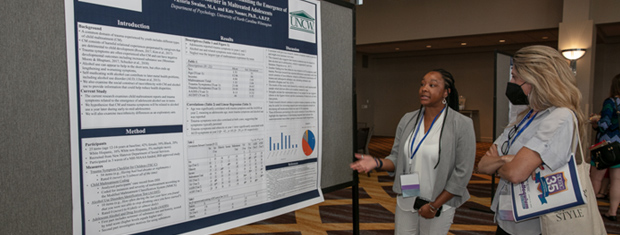




The APSAC Advisor is a peer reviewed quarterly news journal for professionals in the field of child abuse and neglect.
The APSAC Advisor provides succinct, data-based, practice-oriented articles that keep interdisciplinary professionals
informed of the latest developments in policy and practice the field of child maltreatment. It is designed to highlight
best practices in the field and publish original articles and current information about child maltreatment for professionals
from a variety of backgrounds including medicine, law, law enforcement, social work, child protective services, psychology,
public health and prevention in the U.S.
 If you wish to learn more about submitting an article to the Advisor, please click here.
If you wish to learn more about submitting an article to the Advisor, please click here.
This library contains Advisor issues dating back to the first issue in 1988. The most recent issue appears at the top.
Scroll down to select past issues by year and issue number. Once a publication appears in the box, you
can use the Enlarge button to open the document in a new window or tab (depending on how your browser is set up).
This will allow you to view the document with larger print.
To print a document, first use the Enlarge button to open the document in a new window or tab. Then use your browser's Print command.
To return here from a new tab, close the tab. To return from a new window, click your browser's Back button.
In the listing below, click on a year and issue number to see the articles in that publication.
2023 Number 1
Black Families and The Child Welfare System
The child welfare system has been fraught with racial disparities for Black children and families, showing that there is significant work needed to reform the system. While prior research has expanded the field’s knowledge of racial inequities, few studies have been conducted with methods that center Black families and community. This paper describes a framework for anti-oppressive and anti-racist research in child welfare, which emerged from a research team’s work in conducting an Institutional Analysis on racial disproportionality and disparities in one community. Six guiding principles are shared to describe how this work applied an equity-centered and justiceoriented approach to interrogating the child welfare system and identifying potential solutions for reducing structural inequalities.
This study employs a Self-Sufficiency Range (SSR) to examine racial disparities in income for foster care youth. Data were collected from 198 foster families across Washington State. Forty-seven percent of families fell below the minimum SSR for their region. Black and Hispanic caregivers, the majority being kin, were more likely to be unlicensed, and 67% of unlicensed kinship-care families fell below the minimum SSR. Furthermore, 81% of Black caregivers reported income below the SSR compared to 43% of White caregivers, and Black foster youth were more likely to be living with families below the self-sufficiency range. Policymakers need to address the disproportionate burden on unlicensed and Black foster caregivers and adjust the child welfare system to reduce any systematic inequities.
Legacies of racism, discrimination, and oppression undergird health and social inequities for African Americans in the United States. In response, research-practitioners across various sectors have increasingly employed participatory methods to collaborate with African Americans in addressing causes and consequences of structural racism. These approaches have been gradually gaining prominence in child welfare research and reform. This study explored the utility of Community Cafés�"an evidence-based participatory model to engage community members who have had contact with the child welfare system (CWS) to inform a multilevel intervention aimed at reducing CWS contact and preventing placement into foster care. Eight Community Cafés were held over 4 days with 101 participants. Results indicated participants felt the café process provided a safe space for open communication, where their voices were heard and valued. Participants also viewed the cafés as an opportunity to meet, connect and share information and contribute to the common goal of building and strengthening community. Implications for future research and practice for Community Cafés in collaborating with African American families in child welfare research are discussed.
The disparate and disproportionate involvement of African American families in the child welfare system has been well documented, but research examining the experiences of African, Caribbean, and Black (ACB) Canadian families in child welfare is emerging in Canada. In the province of Ontario, specifically, recent studies find that Black families are represented in the child welfare system at disproportionate and disparate rates. Experiences of Black youth, caregivers, and workers also highlight differential and punitive treatment within the system. These findings have given rise to the development of the African, Caribbean, Black Family Group Conferencing Project (ACB-FGC), a restorative, culturally responsive innovation to support Black families at risk of, or already engaged in, the child welfare system in the Greater Toronto Area (GTA). In this conceptual article, we describe the community-based research that led to the development of the ACB-FGC model and implications of ACB-FGC for provincial policies and practices to address anti-Black racism in the child welfare system and among partner institutions.
The Multi-Ethnic Placement Act: Preventing Discrimination, or Promoting Color-Blindness?
The Multi-Ethnic Placement Act/Interethnic Adoption Provisions (MEPA-IEP) are policies based on color-blind racial ideology that are designed to decrease time to permanency, prevent racially discriminatory placement decisions, and facilitate recruitment of diverse foster/adoptive parents. Since implementation, children of color continue to experience disproportionate entries into care and spend more time in care. Samerace adoptions have declined, and recruitment of prospective parents of color has not been prioritized in implementation efforts. A repeal of MEPA-IEP is needed to remove the color-blind features of the policy. Ideal replacement legislation would encourage workers to use race as a criterion to evaluate the ability of prospective parents to meet children’s needs, provide incentives for states to recruit foster and adoptive parents of color, and mandate prospective parent and workforce training to facilitate cultural and relational permanency for children.
Anti-Black Racism Within Child Welfare Services: Past, Present, and Future
Longstanding criticism of the child welfare system (CWS) as being overly punitive and invasive has recently gained new momentum with a grassroots movement to defund, abolish, or otherwise radically transform CWS. This movement contends that CWS in the United States is inherently and irreparably biased against families of color and requires radical transformation. The aim of this article is to further a dialogue with those calling for radical transformations of CWS. First, we aim to consider historical and contemporary factors that have contributed to the present racial disproportionalities in child maltreatment and child welfare involvement. We argue that our current crisis-oriented, rather than prevention-oriented, framework leads to an overly punitive response toward families from marginalized racial groups, and that reforms to CWS are indicated. We then provide an overview of grassroots movements calling for the abolition of CWS. Finally, we present considerations for moving forward by acting on areas of overlap between the abolition and reform perspectives, including taking an anti-racist stance in child welfare and the importance of tackling racial and economic inequalities as prerequisites to equity in child protection.
APSAC Advisor 36(1) - Full Issue